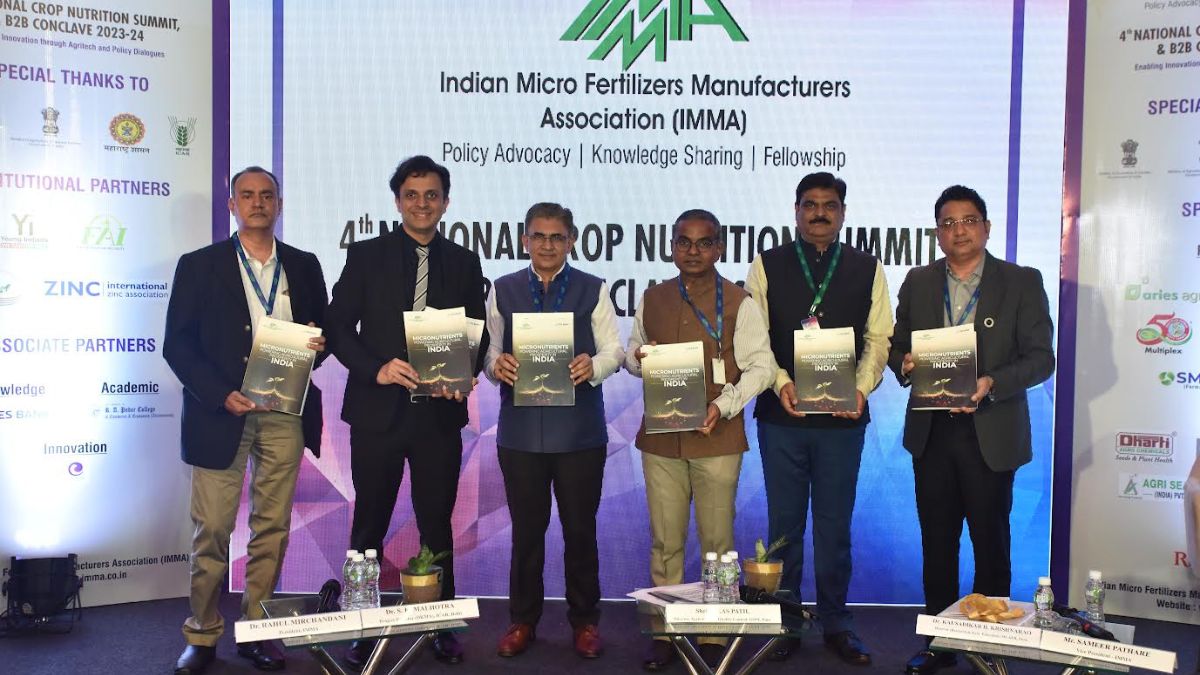IMMA Concludes its 4th National Crop Nutrition Summit in Mumbai
The event spotlighted various agri-tech solutions for precision farming, real-time crop monitoring, aerial spraying, and comprehensive data analytics. Meanwhile, Aries Agro introduced a revolutionary soil testing kit, offering instant and accurate soil health assessments to enable informed crop nutrition management.

Advertisement
Mumbai : The Indian Micro Fertilizers Manufacturers Association (IMMA) concluded its 4th National Crop Nutrition Summit in Mumbai, unveiling a series of agri-tech innovations that echo Prime Minister Narendra Modi’s vision of revolutionizing Indian agriculture with drone technology. This landmark event marked the debut of sophisticated AI-driven drones and digital soil scanning technologies by pioneers Aries Agro Limited, Multiplex Drone, and many others, heralding a new dawn for farming efficiency and sustainability in India.
Dr. Rahul Mirchandani, President of IMMA, shared, “The technologies showcased at the summit are monumental in advancing toward a future where every farm in India can harness the efficiency and precision of AI and digitization. These innovations exemplify the transformative potential of agri-tech in enhancing crop yield, minimizing resource waste, and promoting sustainable farming practices.“
The event spotlighted various agri-tech solutions for precision farming, real-time crop monitoring, aerial spraying, and comprehensive data analytics. Meanwhile, Aries Agro introduced a revolutionary soil testing kit, offering instant and accurate soil health assessments to enable informed crop nutrition management.
“The integration of these advanced technologies into everyday farming practices is a testament to India’s readiness for a digital agricultural revolution. Embracing agri-tech is pivotal for the sector’s growth, contributing significantly to national food security and environmental sustainability” stated Mr. Sameer Rajan Pathare, Vice President of IMMA.
The summit not only served as a platform for technological unveilings but also fostered critical discussions on ‘ease of doing business’ policies for enabling the innovative products to reach the market. A blockbuster panel of experts including industry, government, legal professionals, and innovators discussed policies that will serve as catalysts for agri-tech adoption, liberalised licensing, export promotion and rural digital infrastructure development. These conversations underscored the necessity of supportive policy frameworks and public-private partnerships in achieving the widespread implementation of agri-tech solutions.
As the 4th National Crop Nutrition Summit concludes, the path forward for Indian agriculture is clear – embracing AI, digitization, and sustainable technologies is crucial for transforming the sector. IMMA remains committed to spearheading this change, advocating for policies that facilitate the adoption of agri-tech innovations, and working towards a future where technology-driven farming is the norm across India.
Advertisement

